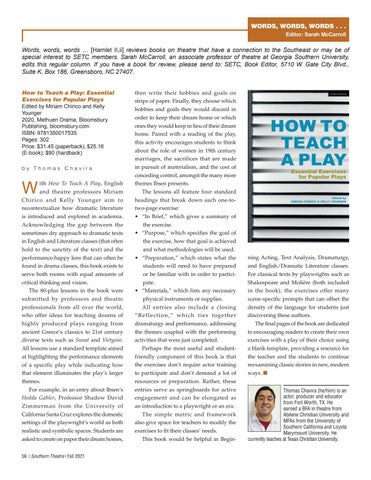WORDS, WORDS, WORDS . . . Editor: Sarah McCarroll
Words, words, words … [Hamlet II,ii] reviews books on theatre that have a connection to the Southeast or may be of special interest to SETC members. Sarah McCarroll, an associate professor of theatre at Georgia Southern University, edits this regular column. If you have a book for review, please send to: SETC, Book Editor, 5710 W. Gate City Blvd., Suite K, Box 186, Greensboro, NC 27407. How to Teach a Play: Essential Exercises for Popular Plays Edited by Miriam Chirico and Kelly Younger 2020, Methuen Drama, Bloomsbury Publishing, bloomsbury.com ISBN: 9781350017535 Pages: 302 Price: $31.45 (paperback); $25.16 (E-book); $90 (hardback)
then write their hobbies and goals on
by Thomas Chavira
in pursuit of materialism, and the cost of
strips of paper. Finally, they choose which hobbies and goals they would discard in order to keep their dream home or which ones they would keep in lieu of their dream home. Paired with a reading of the play, this activity encourages students to think about the role of women in 19th century marriages, the sacrifices that are made conceding control, amongst the many more
ith How To Teach A Play, English
themes Ibsen presents.
and theatre professors Miriam
The lessons all feature four standard
Chirico and Kelly Younger aim to
headings that break down each one-to-
recontextualize how dramatic literature
two-page exercise:
is introduced and explored in academia.
• “In Brief,” which gives a summary of
W
Acknowledging the gap between the sometimes dry approach to dramatic texts
the exercise. • “Purpose,” which specifies the goal of
in English and Literature classes (that often
the exercise, how that goal is achieved
hold to the sanctity of the text) and the
and what methodologies will be used.
performance-happy lens that can often be
• “Preparation,” which states what the
ning Acting, Text Analysis, Dramaturgy,
found in drama classes, this book exists to
students will need to have prepared
and English/Dramatic Literature classes.
serve both rooms with equal amounts of
or be familiar with in order to partici-
For classical texts by playwrights such as
pate.
Shakespeare and Molière (both included
critical thinking and vision. The 80-plus lessons in the book were submitted by professors and theatre
• “Materials,” which lists any necessary physical instruments or supplies.
in the book), the exercises offer many scene-specific prompts that can offset the
professionals from all over the world,
All entries also include a closing
density of the language for students just
who offer ideas for teaching dozens of
“Reflection,” which ties together
discovering these authors.
highly produced plays ranging from
dramaturgy and performance, addressing
ancient Greece’s classics to 21st century
the themes coupled with the performing
to encouraging readers to create their own
diverse texts such as Sweat and Vietgone.
activities that were just completed.
exercises with a play of their choice using
All lessons use a standard template aimed
Perhaps the most useful and student-
a blank template, providing a resource for
at highlighting the performance elements
friendly component of this book is that
the teacher and the students to continue
of a specific play while indicating how
the exercises don’t require actor training
reexamining classic stories in new, modern
that element illuminates the play’s larger
to participate and don’t demand a lot of
ways. n
themes.
resources or preparation. Rather, these
For example, in an entry about Ibsen’s
entries serve as springboards for active
Hedda Gabler, Professor Shadow David
engagement and can be elongated as
Zimmerman from the University of
an introduction to a playwright or an era.
California Santa Cruz explores the domestic
The simple metric and framework
settings of the playwright’s world as both
also give space for teachers to modify the
realistic and symbolic spaces. Students are
exercises to fit their classes’ needs.
asked to create on paper their dream homes,
This book would be helpful in Begin-
56 x Southern Theatre x Fall 2021
The final pages of the book are dedicated
Thomas Chavira (he/him) is an actor, producer and educator from Fort Worth, TX. He earned a BFA in theatre from Abilene Christian University and MFAs from the University of Southern California and Loyola Marymount University. He currently teaches at Texas Christian University.


